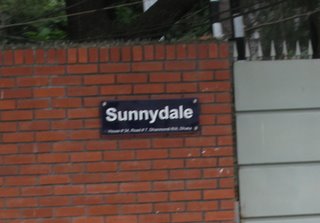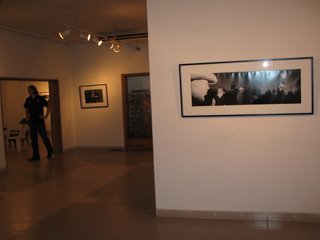I phoned reception to let them know that Trent was on his way, but was stirred again about 30 minutes later by a ruckus outside the gate. Whatever it was, I thought, I’d better bring my wallet and my phone. To cut a long story short, there had been a mix-up with the bookings and Trent ended-up having to stay the night at another hotel around the corner, which I was later to hear, evoked certain unpleasant memories of Calcutta in the mid-nineties.
But Trent Parke is a robust sort of fellow whose marvelous constitution allowed him to join us for breakfast at The Ambrosia in the morning. Laughs and sweet tea all round. By this time though, he was lunging at mosquitoes like an attack dog. Robert Pledge emerged from his room in fine form and appeared completely relaxed about his next 24 hours at the National Museum. A cool dude is Robert Pledge. We were joined by Reza and also Violet, a journalist from the Philippines (whose luggage had been accidentally redirected to Arizona) and made our various ways to DRIK.

No wonder things get crazy here at night time. We’re living on the hell-mouth, people!! I can’t believe I didn’t notice this before! (That one was for “Buffy” fans only, sorry)
Fortunately, the beginning of the day didn’t set a template for the rest of it. Hanging the work at the Bengal Gallery with their lovely staff was fast, efficient and punctuated by a couple of rounds of lovely Bengali tea. I am happy to say that all but two of the works in the show are now hung, and Trent and I await the delivery of these lightboxes tomorrow morning. I revisited the Bengali restaurant that Khairul took me to earlier in the week with Trent for lunch, and we prepared ourselves for the press conference at DRIK at 4pm.

“Ten days ago, our city was in flames”, Shahidul reminded the audience during the press conference. And it’s true that Chobi Mela has come together as a stimulating program of exhibitions, events, lectures and workshops, through extraordinarily adverse circumstances. Trent and several other artists, as well as participants from other organisations and fields of endeavour (including myself) spoke to the crowd about our particular interest in attending the festival.

For me Chobi Mela is not only a festival that celebrates photojournalism but also challenges photojournalists and photographers to look at their practice from another place and another viewpoint. It also takes the work of internationally renowned artists to the streets, outside the exclusive zones of museums and galleries. It is therefore fitting that the theme of the fesival is "Boundaries". It is not easy to show this work here in Dhaka, either fiscally, practically or politically and yet it happens through the work of so many artists, workers, volunteers and supporters.
Later:
I have just arrived back from a function at the Australian High Commission in Gulshan. Gulshan is a suburb that looks like it’s quite close-by on the map, but being Dhaka and heavily congested with traffic, we found ourselves embarrassingly late by over half an hour (as almost comatose from the carbon monoxide we inhaled on the city’s fly-over).
The AHC and especially the Deputy Commissioner, Richard Rogers have been incredibly helpful with assisting Minutes To Midnight on it’s passage from Australian Centre for Photography to Bangladesh. After being here these few days, I fully realise how essential this support has been to the exhibition. Richard is a pretty easy-going bloke who shared a lot of interesting stories about his work in Dhaka, his moves from diplomatic posts in Perth, Adelaide, then Canberra, as well as the trials of recently contracting dengue fever which he described as a “a week in hell” and (less unpleasantly) of working a “10 kilo post”, which of course refers to the amount of weight that one gains eating a diet that consists of mainly Bengali curry and therefore, ghee, for three years.
Besides taking care of Australian and Bengali relations, the High Commission also runs aid and cultural programs in the country. Trent and I met a former photographer, Peter (have to look-up that second name again!) who coordinates one of these programs with street kids. The High Commissioner, Douglass Foskett gave a great speech congratulating Trent on his work and also acknowledged the work of invited artists and arts workers from Bangladesh who were present at the function – many of whom had already exhibited in Australia.

A cool little, hand-painted, natural gas CNV to say goodnight.
No comments:
Post a Comment